Aladdin
- Bryce Chismire
- Jul 31, 2019
- 11 min read
Updated: Mar 9, 2021
This is one of those kinds of reviews I’ve been looking forward to doing since I started the Screened Word: to look over some of my childhood icons as I let my adult perceptions do all the work. In this case, I’ll be looking all over one of the most imaginative movies ever made by Disney, Aladdin.
As I watched this movie as a kid, I obviously enjoyed it for its bright colors, non-stop humor, and its cohesive action scenes. And yet, even though I haven’t seen it in years, and even though I’m an adult now, there was just something about the movie that makes me still reflect on it with the utmost admiration. Was it just a fascinating remembrance of my childhood, or is there something more to the movie I haven’t seen yet? So, because of that, I’ll do the best I can to give this movie a fair review without accidentally subjecting it to nostalgic idolization.

Let’s start with the story. It’s about a street urchin named Aladdin, who, along with his monkey buddy, Abu, constantly tried to survive in the Middle Eastern city of Agrabah. However, things took an unexpected turn for them when they were lured into the Cave on Wonders to find a lamp, and once they found the lamp and rubbed it, a Genie emerged to grant Aladdin three wishes. Seeing the opportunity, Aladdin seeked the Genie’s help to grab the attention of the lovely Princess Jasmine. Meanwhile, the royal vizier of Agrabah, Jafar, also had his eyes set on the lamp, for he intended to use it to take control of Agrabah for himself. When he found out that Aladdin had the lamp he so desperately sought for, things started to flare up as Aladdin had to take on Jafar while also trying to save Agrabah and the princess herself.
I will say right off the bat that the animation is gorgeous. The environments are luscious and atmospheric, and I really admired the fluidity of the movements of the characters. It can be slow when it needs to be, it can be fast-paced to the point of providing good exhaustion, and it all felt just right. And speaking of the characters, I have to give MAJOR props to the animators who brought the Magic Carpet to life. The idea that they were able to take an inanimate object like the carpet, with no eyes, no mouth, and no face, and give it so much creative and rhythmic movement that it all formed a personality for the Carpet...I'm telling you, that would've called for an award for them, they pulled it off so well.
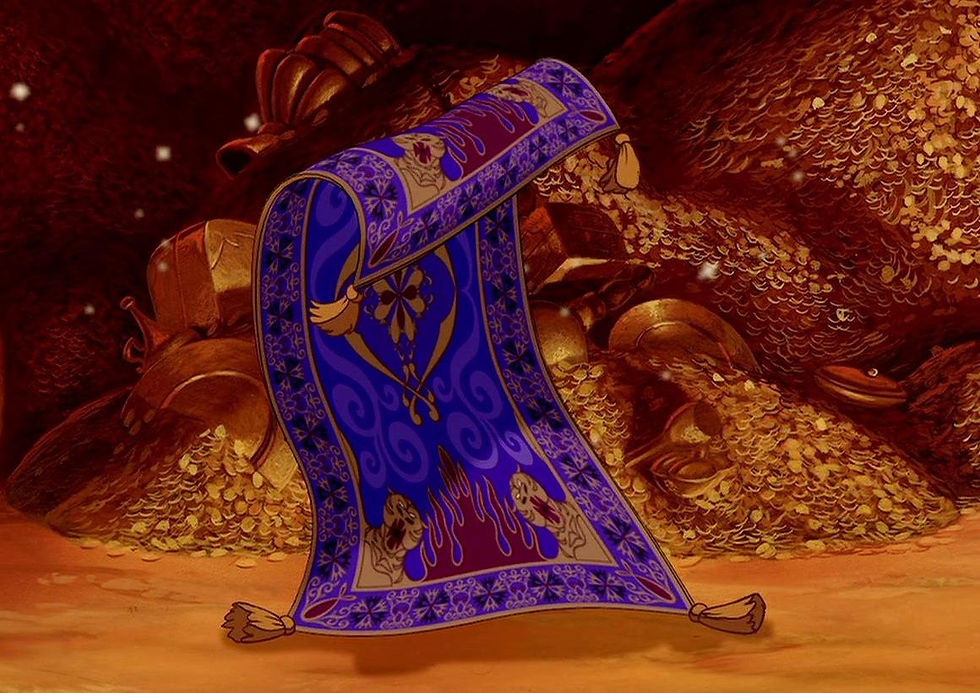
Also, I am pretty fond of how Agrabah was portrayed. Even though the townspeople may be somewhat stereotyped – I remember hearing that the design of the guards drew some ire from Arabic focus groups – the movie still provided a romantic and inviting portrait of a typical Middle Eastern society that also happened to be surprisingly non-sugarcoated. When Jasmine, as a peasant, accidentally stole an apple for a starving boy, a vendor caught her doing that and downright attempted to cut off her hand in retaliation for it. And, when Jafar was lying to Jasmine about Aladdin's execution, he outright said that he'd been executed by decapitation.
The last time I checked, decapitation and dismemberment, both as capital punishments for committed crimes, are still being practiced in Middle Eastern countries as of this writing. And that is the one facet of Disney that I always admired: the side of Disney that is ballsy and isn’t afraid to teach kids and/or families some harsh life lessons – without going over the top about it – as part of a certain movie’s story.
And of course, the characters themselves were delightful in their own way, if a skosh too standard. The main character himself, Aladdin, was your typical rapscallion who had a heart of gold and proved himself worthy by the end. He's nothing retrospectively special, but he's still a good character. Yet, I honestly thought that the time he spent pretending to be Prince Ali Ababwa was when I found him the most interesting. Given his background as a street urchin, where he also had to be manipulative with false stories, it was neat to see what he could've pulled off with them, and what others he struggled with. He also tied in nicely with the movie's themes, which I'll elaborate more on later in this review.
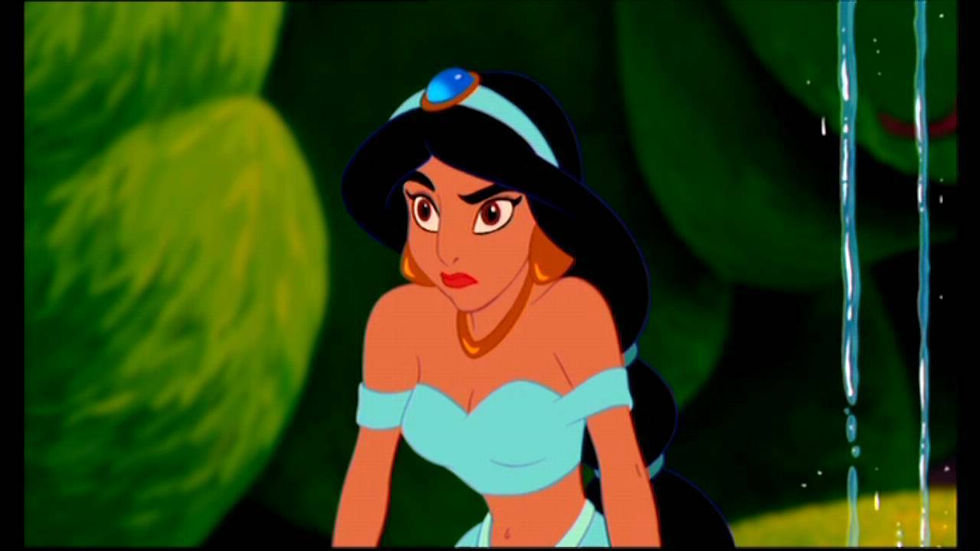
Princess Jasmine was likable as well. She's spirited, a little feisty, and wasn't afraid to be vocal about what she believed was right, especially when it came to her being, in the eyes of other royalty, "a prize to be won". Now, I did acknowledge that she flip-flopped between being your typical Disney princess who longed for something to come her way and being your everyday rebellious teenager who, in her yearning for freedom, ran away from home. This was where people were torn over her character, and in many respects, I can see where they're coming from. As a role model, this would've made her look uneven and unfocused. However, she did two things that somehow made me mind her less in spite of her flaws. One was when she confronted Jafar about allegedly executing Aladdin shortly after she, while pretending to be a peasant, met him at the marketplace. She clearly wasn't happy when she was told that, but after talking to the Sultan about it, they all worked it out with Jafar, and in her distrust towards him, stated,
At least some good will come with my being forced to marry. When I am queen, I will have the power to get rid of you!
That clued me in that while Jasmine was aware of the restrictions that came with her role as the princess of Agrabah, she's also coming to terms with the fact that it wasn't without its assets, and that she would've taken full advantage of that for the greater good, especially by the time she became queen (or should I say, sultana?). She said the last part herself, after all. That was actually a good example of how to be a good princess, especially when you look at what the real-life princesses of the past and present had to deal with.
And the other was when she attempted to distract Jafar in the climax so she can give Aladdin and Abu some time to retrieve the lamp. Other people may dismiss it as an extreme case of femininity, but...that's part of the idea. And the intention behind it, along with the stakes that came with it, completely wowed me. Even though, technically, she could've stolen the lamp herself, and that, yes, the attempt backfired in the end, the fact that she was putting her life on the line by playing the sexy wife with the one man she distrusted and who she knew had the hots for her, and all in her own feminine ways, no less, was still pretty ballsy.
Something else I should mention about Jasmine before I move on was that the filmmakers, after taking umbridge with Jasmine starting off as being too rebellious, wanted to make her sympathetic, but still active. For example, when Jasmine was lied to about Aladdin's alleged execution, instead of continuously crying over it to her father, the Sultan, she would've confronted him instead and said to him, "We need to talk." And later, when she was trapped by Jafar in the hourglass in the climax, instead of waiting for Aladdin to break her free, she would've used her metal crown to use on the glass to break herself free. Personally, I found them to be missed opportunities for Jasmine; they would've established her as the rounded, strong female role model we would've expected her to be. Ah, well, I'm still fine with how she ended up.
So, long story short, she was still a cool character with strong opinions and good ideals, and I respect that.
The Sultan, I think, was the closest thing to a kid-appeal character this movie had. He had a childlike personality, and was always eager for her daughter to have a husband to look after her, and the only sultan-like thing we saw him do was *SPOILER ALERT* change the law so that Jasmine would have married who she felt was fit for her. That doesn't make him a bad character, though. He's still charming and delightful, and who can say no to that?
The sidekicks were pretty fun, too. Abu was a delightful monkey who had an unhealthy habit of stealing whatever he can get his hands on, even moreso than Aladdin. Rajah was a nice tiger that Jasmine should've been thankful to have as a pet. I mean, who needs a guard dog when you can have a tiger on patrol? And...the other sidekick, it's part of what I'm about to discuss next.
Now that I've got the decent stuff and the closest things I have to gripes with the movie out of the way, let's look at the five things that really drew me back to the movie.
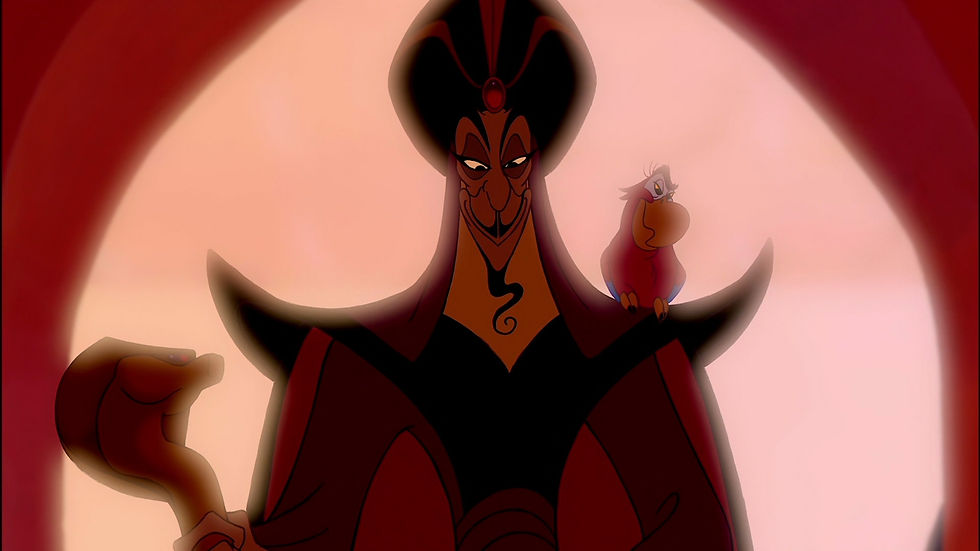
The first one is the villain, Jafar. I loved just how slimy and manipulative he can be, whether it's on the Sultan with his snake staff, or on anyone else. I was especially impressed that he was able to spread lies that really made others feel bad about themselves, like when he made Jasmine feel shameful for indirectly causing Aladdin's death, even though that wasn't true. His design and voice fit him like a glove, too. Broadway actor Jonathan Freeman lended him a voice that had a certain sultriness and charisma that made him and his actions feel more deliciously slimy than ever. And it's all boasted by his suit, which gave off an appearance that was strong and regal, but also sinister and intimidating; a perfect fit for Jafar, if you will. His scenes were really fun to watch, and he was declared one of the best Disney villains of all time for a reason. His sidekick, Iago, was also what made his and Jafar's subplot so deliciously slimy: he provided the villains' levity. Iago was loud, obnoxious, sarcastic, and easily lost his temper, making him a good foil for Jafar. And his voice, provided by Gilbert Gottfried, made his outbursts a lot more hilarious.
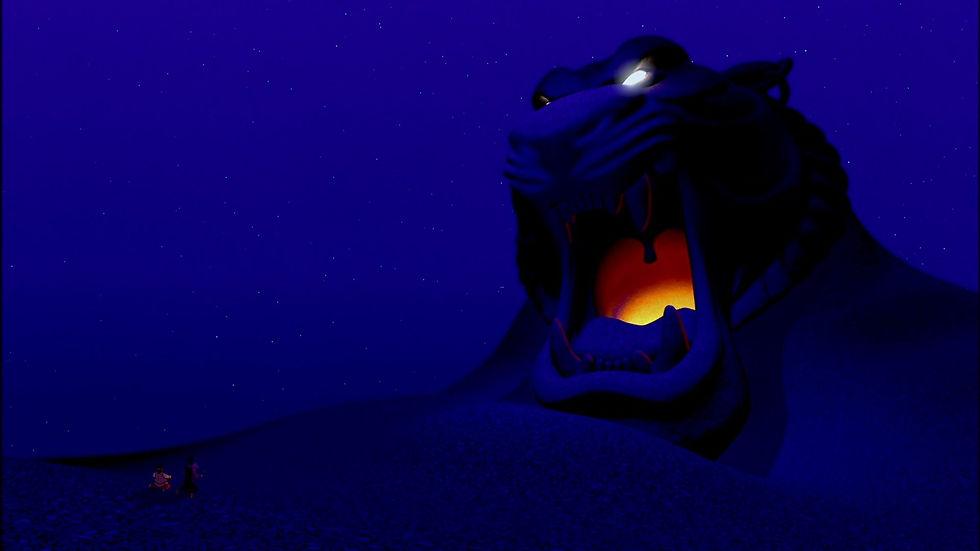
The second one is the Cave of Wonders sequences. I loved them because of how ominous and therefore suspenseful they were, even in an animated film meant for families. Why is that? Well, to start with, the Cave's head was animated with early 90s CGI, which even today, look unnatural. However, that couldn't have been more appropriate: the Cave itself was an unnatural force, anyway. Also, the Cave of Wonders housed a lot of treasures, but only the "diamond in the rough" would be allowed in. As for anyone else, because the cave liked to keep its messages cryptic, you never could tell if the Cave would let the visitors through or kill them. This was demonstrated at the beginning when Jafar let Gazeem, a thief, go on in, only for Gazeem to be eaten alive a minute later. And I'll admit, I still can't listen to his scream without getting a few chills. Aladdin's ventures into the Cave weren't any better. Even though he did get the lamp, Abu was tempted to grab the Forbidden Treasure, which was a big no-no because they weren't supposed to be touching anything besides the lamp. So, in a fit of rage, the Cave started to crumble around them from the inside, as Aladdin and his gang attempted to escape. The top-notch animation, the tight angles, the booming music, and high speed all added a sense of – nay, poured – adrenaline to these scenes and propelled them from being top notch action scenes into action thrill rides that could easily have fit into a Hitchcock thriller or in an Indiana Jones flick. They really pulled me to the edge of my seat, never with fail.

Speaking of the music, that, as well as the songs, are the third thing I really liked about the movie. What can I say about it? This is Alan Menken's work, almost anything he touched is pure gold. The music can be upbeat, moody, delightful, intense, triumphant, you name it, it hit all the right notes. And the songs, they're just as good. I could listen to the mysterious and perfectly stage-setting 'Arabian Nights' forever, 'Friend Like Me' is a showstopping number fit for the Genie himself, 'A Whole New World' is a beautiful, dreamy romantic ballad, 'Prince Ali' is a rousing number that could've passed for one epic promotional piece, and even Jafar's reprise of 'Prince Ali' made for a nice foil as he uncovered Aladdin for who he was. I even saw commentators joke around about how Jafar did the worst thing a villain could ever do: throw the main theme of a hero back into his face. Aladdin actually went on to win Oscars for its music and songs, and it really shows.
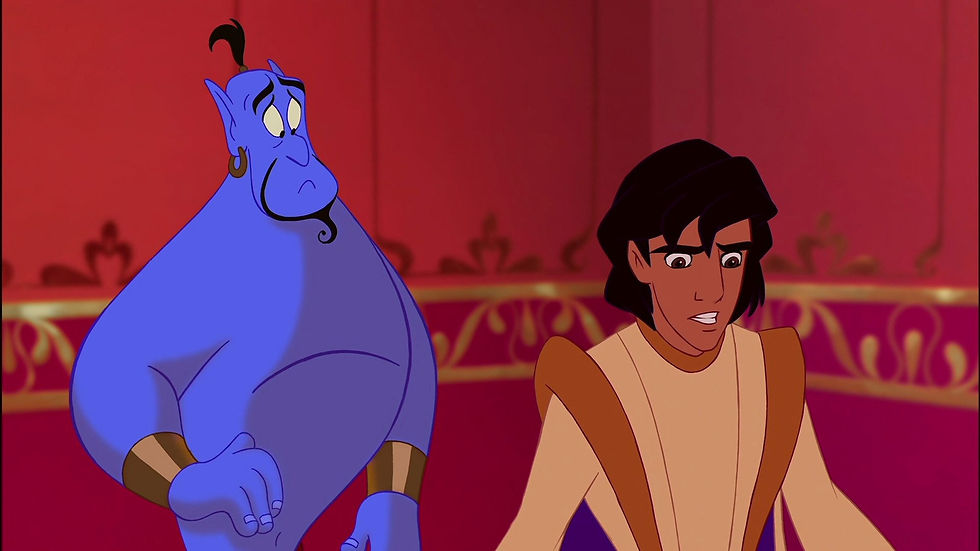
The fourth good thing about the movie is its themes. These days, there are a lot of movies that try to tell the message "be yourself" to characters who are wimps or who just didn't know how to express themselves as they should. But nowhere was that message executed more perfectly or succinctly than here in Aladdin. We have Aladdin, a low-life criminal in the eyes of Agrabah society, trying to pass himself off as a prince to the Princess Jasmine, because then, he believed, he would've been seen as a worthy suit for her. He even acted like he suspected a prince should, when really, he should've been expressing himself as the diamond in the rough that he was. This led to one scene I really liked where he was arguing with the Genie about living as a prince. Should he honor his word, free the Genie at his third wish, and tell everyone, especially Jasmine, the truth about himself, or should he keep the Genie around, keep up appearances, and continue living a lie? Those questions were brought up as the movie went further on, and it was a joy to see it discussed as insightfully as it was here.

And the fifth best thing about the movie – yep, you can tell that I was saving the best for last – was Robin Williams as the Genie. He was already a fun character when I saw him as a kid, but when I saw him again as an adult, he just blew my mind. The sheer wackiness, silliness, and power he showed in the movie was backed up wonderfully by Robin Williams' fantastic performance, who gave the Genie a comedic overtone that could never be topped. The Genie dropped off references that more adults would catch than the kids would, he churned out jokes a mile a minute, and his liveliness when hand-in-hand with Williams', for lack of a better word, 'animated' personality. It was an absolute match made in heaven. The way I see it, I believe that one of the biggest ingredients that every quality family entertainment needs is something that means one thing to children, but then means something else entirely to the adults. Underneath all that comedic showmanship and power, however, we also see a vulnerable side of him who longed to be free. That's something you don't see everyday – at least, not with beings as powerful as the Genie – and it was a welcome detail that added a level of humanity to him.
I do see that the movie has its jagged edges, but so much of what the movie pulled off is too good for me to judge it as anything less than that. The animation is terrific, the characters are memorable in their own ways, the comedy is fruitful, the thrills are genuine, the music is fantastic...I almost feel blessed to have grown up with such a film as this. Not only is this one of my favorite animated movies of all time, I have no shame in saying that this might be one of my favorite movies of all time, too.
Aladdin, the character, may be a diamond in the rough, but Aladdin, the movie, is a diamond...through and through.
Additional Thoughts:
– Oh, Al, I'm getting kid of fond of you, kid. Not that I want to pick out curtains or anything...
Okay, is it possible for a joke to get better with age? Because given all the positive LGBTQ representations brewing about as of late, this joke definitely felt like one to me!
– *SPOILER ALERT* As the Genie was about to depart after being freed, his goodbye with Aladdin was sweet, but after watching this after Robin Williams' suicide, this definitely got me teary-eyed a little.
– *SPOILER ALERT* After the Genie has been finally freed by Aladdin, how is it that he kept his magic on him after being freed? Who knows...
– Robin Williams initially hesitated on playing the Genie, but decided to do so since he wanted to play a Disney character...and for more complicated, contractural reasons. He ended up having such a ball playing the Genie, that he recorded up to a whopping sixteen hours' worth of audio recordings of him as the Genie. That's enough to encompass the entirety of shows like My So-Called Life or Gravity Falls from beginning to end! Wow! Also, in his will, he asked that the 16 hours of material never be released to the public until 25 years after his death. I know I'll live to see it come to light, so I almost can't wait to hear practically everything that he pulled off as the Genie from the early 90s.





Comments